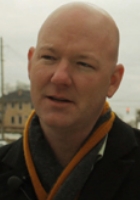Letter Written On The James Poem by Jake Adam York
Letter Written On The James
When you ask, I'll want to say maybe—
maybe I have been here before,
family tour, class trip hemmed
in the back of the bus, or maybe
it's just photographs I remember,
the light that seems familiar,
the rain, the sepia morning,
the sepia afternoon that hold me
in a shop window over a history of the city
I could walk through if I knew the way.
How long have I waited, sure some old idea
was about to come back,
waiting for someone to come and lead me away?
The smell of the bindings' glue,
the thread now broken, fallen
into a breath of tobacco and clay
and the little snows of lint
that fall whenever we check our phones.
So here I am in Carytown,
not remembering how I got here,
when the pressure drops, the rain comes again,
and I feel like I'm rising out of myself,
becoming a column of air anyone can pass through,
taking some of the vapor,
some of the warmth I have left
and carry it through the streets to wherever they want.
Then, maybe I'm there, too, staring at a window's
perfect sky in one of those hours
when a camera can make a morning of an afternoon,
dusk from dawn's first feathers.
Then the day is a damp newspaper
folded on itself, one side smudging itself
on the other, and it's easy to forget
what side of time you're on...
Then the day comes apart,
decoupling in the wash of the James,
a drummer in Confederate gray
takes up beneath the monument of Robert E. Lee,
and then it's only the motion
that distinguishes the living from the god.
If we could raise the image from the gutter
or the river, maybe we'd see them there
burning into one another,
or maybe they'd just roil
into another cloud of birds
remembering what cannon smoke looks like,
starlings, blown from the explosion
and swept back north, pulled,
as if on strings from the bluebirds' cavities
and reeled back into the cages, the cages
back to the boat, to Britain, to Shakespeare,
a strange display over the veteran's barbecue—
dark firework in the evening of a century—
and everyone sucks his beard back into his face
and returns to the lines. And maybe
this kid is one of them, almost a grandfather
when the day runs back against itself
and he knows Lincoln will emancipate the bullet
and they will have to fight the Seven Days again,
the young men, pale as fresh sheets of paper,
furling from Hollywood Cemetery
over Oregon Hill with orders
for Mechanicsville and Totopotomoy,
but this time the statues of the generals
are already there.
It is morning in Richmond, it is evening,
and the generals are bronze, impervious,
so they march against the traffic,
Church Hill and Union Hill,
but no sees them, their slight exposures
just tissues, vapor on the glass.
Maybe we've all seen this too many times before...
You can wait until the glasses are filled,
until the day shakes the ash from its cigarette,
like lint from the wounds
of the recalled battalions, filing from Chimbarazo
or the herons and egrets and gulls
riding their thermals from the river
then drifting back again,
stars spinning behind the sun
so the twins come down.
One relieves the other, taking the drum
and slinging it over his fresh gray coat,
its buttons and the drum's knobs
rhyming in the wipe of headlights,
the other, unbuttoned, cupping his face
in the bookstore's window
so he can get the cigarette
to learn the flame. The smoke plumes
into a parenthesis. The drumming stops,
and they amble off into the dim.
Anyone could see them stopping on a corner
to catch a breath.
Maybe they've been doing this so long
they've forgotten all the rest.
In the twilight, they cross the Fan,
then slip back into the cemetery
and down the bluff.
They've got little discs of biscuit in their pockets
they'll throw to the riverbirds
for a while, until even they get tired.
You've seen all this before,
that moment when day retreats,
an explosion folding back into a cannonball,
foam dying back into the beer.
If someone mentioned it,
you would shake your head,
but no one says anything...
Not the twins, who are done
casting their biscuit to the birds,
or the birds, who fold
into the foliage along the banks.
We say they are sleeping now,
but we can see them, feathers casting back the light,
we see them, glowing like lamps
all along the water, like pineknots
stevedores used, so fierce it seems
the dark can't touch them.
They burn all night, each night,
in case anyone remembers.
There is no other way they can tell us
there is only one year,
and it repeats itself forever.
This poem has not been translated into any other language yet.
I would like to translate this poem